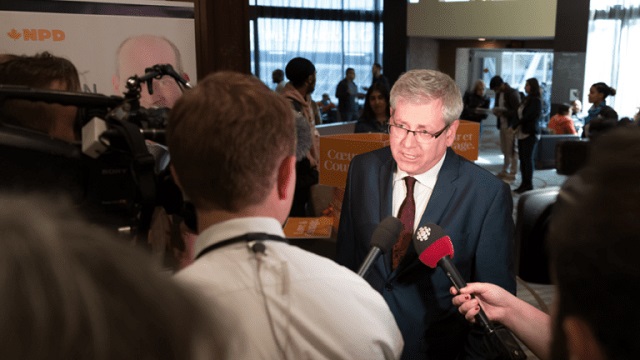By Karen Ogen-Toews
MP Charlie Angus needs to withdraw his offensive attempt to silence discussion and apologize.
First Nations are used to oppression. We lived for over a century with the heavy hand of the Department of Indian Affairs. We coped with bossy and even mean Indian agents. The government of Canada told us where to live, how to learn, tried to destroy our language and culture, and undermined our traditional economies.
We are sick and tired of being told what to do and think. We can do these things for ourselves. But First Nations know that paternalism is far from dead in Canada.
With his private member’s bill banning promotion of the oil and gas industry, Charlie Angus wants to bring back the oppressive hand of the state in a manner consistent with dictatorships and authoritarian states. The NDP MP for Timmins-James Bay and his party want to shut down fossil fuel production, a move that would devastate the Canadian economy and undermine the greatest — and often the only — opportunity that many First Nations have for economic renewal.
Even that is not enough. He wants to shut us up, telling us what to think and threatening us with jail and fines for not adhering to his strange, unrealistic and dangerous views of energy and environmental protection.
I am a proud spokesperson for First Nations engagement with the LNG sector. My First Nation, the Wet’suwet’en, has been on the front lines of the national debate about LNG and pipeline construction.
We have lived for years with the national media misrepresenting and distorting our community’s views on the Coast Gas Link Pipeline, a major resource project that now has significant First Nations ownership. This project has overwhelming support in my First Nation, not an impression one would get from the media coverage of the environmentalists’ interventions in community affairs.
Coastal Gas Link has already brought well-paid jobs, business opportunities and new financial resources to our people and it will do so for decades to come.
We have monitored the project closely and continue to work with the pipeline company to ensure the environment is protected and our interests respected.
At the First Nations LNG Alliance, we spent years exploring the global environmental impact of liquified natural gas. We know that Canadian LNG, produced to the highest international environmental standards, will allow Asian countries to cut back sharply on coal usage, a process with as much ecological benefit as many of the symbolic steps being taken in Canada and other nations.
It is so tragic that the Canadian discussion about energy and climate change has been reduced to trite phrases, simple concepts and now the unleashing of the authoritarian impulses that remain in the country.
I am confident that many First Nations have spent much more time exploring and debating energy production and use than most Canadian communities. Finding the balance between economic development, local environmental and cultural protection and ecological sustainability is hard work. Our communities discuss energy and infrastructure issues all the time, and we are comfortable with the decisions we have made.
A long-serving member of Parliament, Angus now wants to shut me up. He wants to fine me or put me in jail for doing my job and for presenting First Nations perspectives on fossil fuels. He wants to ban public discussion of oil and gas and has clearly bought into the idea that fossil fuels should be eliminated.
We have no idea about the future that Angus and others have in mind. Perhaps he envisages a country with homes heated by good will, transportation restricted to foot and bicycle, food transported by pack dogs, car-free roads paved only with good intentions and government budgets funded by best wishes.
Many odd and unexpected things come out of the House of Commons, but nothing in recent years is as upsetting and disgraceful as Angus’s private member’s bill, C-372.
So, I say this: Mr. Angus, you have gone much too far. Your private member’s bill is the most ridiculous, paternalistic and reprehensible example of oppression directed at First Nations people in decades. I hope you are embarrassed by your ideological over-reach, and I hope you have the decency to withdraw your bill and apologize.
You insulted Canadians and offended the hundreds of Indigenous communities and thousands of First Nations people actively engaged in the oil and gas sector.
We will not be quiet as we chart the future we want, on our terms and in our territories. Far from silencing us, you have made it abundantly clear that Indigenous peoples must speak for ourselves. Most importantly, we will fight to protect ourselves from the old-style paternalism that lurks way too close to the surface in Canadian public affairs.
Karen Ogen-Toews is the CEO of the First Nations LNG Alliance



















